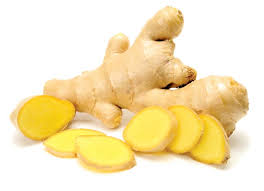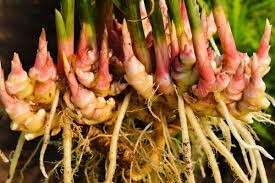Ginger (Zingiber officinale), the family Zingiberaceae, is a flowering plant whose rhizome, ginger root or ginger, is widely used as a spice and a folk medicine. It is a herbaceous perennial which grows annual pseudostems (false stems made of the rolled bases of leaves) about one meter tall, bearing narrow leaf blades. The inflorescences bear flowers having pale yellow petals with purple edges, and arise directly from the rhizome on separate shoots.
Ginger or iginated in Maritime Southeast Asia and was likely domesticated first by the Austronesian peoples. It was transported with them throughout the Indo-Pacific during the Austronesian expansion, reaching as far as Hawaii. Ginger is one of the first spices to have been exported from Asia, arriving in Europe with the spice trade, and was used by ancient Greeks and Romans. The distantly related dicots in the genus Asarum are commonly called wild ginger because of their similar taste.







Medicinal uses
Ginger, known scientifically as Zingiber officinale, has a long history of medicinal use dating back thousands of years, particularly in traditional Asian medicine systems like Ayurveda and Traditional Chinese Medicine (TCM). Here are some common medicinal uses for ginger:
- Digestive Aid: Ginger is widely used to alleviate various digestive issues such as nausea, vomiting, indigestion, and bloating. It can be particularly effective in easing motion sickness and morning sickness in pregnant women.
- Anti-inflammatory: Ginger contains potent anti-inflammatory compounds that can help reduce inflammation in the body. This makes it beneficial for conditions like arthritis, muscle pain, and general inflammat or y diseases.
- Relief for Menstrual Discomfort: Ginger can help alleviate menstrual cramps and pain. Drinking ginger tea or taking ginger supplements may reduce the severity of menstrual symptoms.
- Immune Booster: Ginger has immune-boosting properties and can help the body fight off infections. It is often used to help with cold and flu symptoms.
- Anti-nausea: Ginger is effective in reducing nausea and vomiting, including nausea caused by chemotherapy, pregnancy, or motion sickness.
- Heart Health: Some studies suggest that ginger may help lower cholesterol levels and improve heart health by reducing blood clotting and improving circulation.
- Antioxidant Properties: Ginger contains antioxidants that help protect the body from oxidative stress and damage caused by free radicals.
- Pain Relief: Ginger has been used traditionally as a natural pain reliever. It may help alleviate various types of pain, including headaches, migraines, and sore muscles.
- Respiratory Support: Ginger's warming properties can help promote healthy sweating and act as a natural decongestant, making it useful for respiratory conditions like coughs and congestion.
- Diabetes Management: Some research suggests that ginger may help regulate blood sugar levels and improve insulin sensitivity, which could benefit individuals with diabetes.
These medicinal uses highlight the versatile health benefits of ginger. It can be consumed fresh, dried, as a tea, in supplement form, or as an ingredient in various dishes to harness its medicinal properties. However, it's important to consult with a healthcare professional before using ginger for medicinal purposes, especially if you have underlying health conditions or are taking medications, to ensure it is safe and appropriate for you.
Precautions
While ginger is generally safe for most people when consumed in moderate amounts, there are some precautions and potential interactions to be aware of, especially when using ginger in medicinal or supplement f or m. Here are important precautions and interactions associated with ginger:
- Pregnancy and Breastfeeding: Pregnant women should use caution with ginger, particularly in large amounts, as it can potentially stimulate uterine contractions. It's best to consult with a healthcare provider before using ginger during pregnancy or while breastfeeding.
- Bleeding Dis or ders: Ginger may have a mild blood-thinning effect, which could increase the risk of bleeding in individuals with bleeding disorders or those taking blood-thinning medications (e.g., warfarin, aspirin). Use ginger cautiously and under medical supervision if you have a bleeding dis or der.
- Diabetes Medications: Ginger may lower blood sugar levels. If you are taking medications f or diabetes, monit or your blood sugar closely when using ginger, as it could enhance the effects of these medications.
- Gastrointestinal Conditions: Ginger may w or sen symptoms of certain gastrointestinal conditions like acid reflux or peptic ulcers in some individuals. Consult with a healthcare provider if you have these conditions before using ginger medicinally.
- Surgery: Due to its potential blood-thinning effects, ginger should be discontinued at least two weeks before any scheduled surgery to reduce the risk of excessive bleeding during or after the procedure.
- Allergies: Individuals with known allergies to ginger or related plants (such as turmeric or cardamom) should avoid ginger or use it with caution to prevent allergic reactions.
Interactions
- Blood-Thinning Medications: Ginger may interact with anticoagulant or antiplatelet medications (e.g., warfarin, aspirin, clopidogrel) and increase the risk of bleeding. Monit or closely and consult with a healthcare provider if you're taking these medications.
- Diabetes Medications: Ginger may enhance the effects of diabetes medications, potentially leading to low blood sugar levels (hypoglycemia). Monit or blood sugar levels closely if using ginger alongside diabetes medications.
- High Blood Pressure Medications: Ginger may lower blood pressure. If you're taking medications f or high blood pressure, monit or your blood pressure regularly to avoid excessively low blood pressure levels.
- Heart Medications: Ginger may interact with certain heart medications, including calcium channel blockers. Consult with a healthcare provider if you have cardiovascular issues and are considering using ginger medicinally.
- Other Medications: Ginger may interact with various medications due to its effects on the liver enzymes involved in drug metabolism. Always consult with a healthcare provider or pharmacist bef or e using ginger alongside other medications.
General Recommendations
- Dosage: Stick to recommended doses of ginger supplements, as excessive amounts may cause digestive upset or other adverse effects.
- Quality and Source: Choose high-quality ginger supplements from reputable brands to ensure purity and potency.
- Consultation: Always consult with a healthcare provider bef or e using ginger medicinally, especially if you have underlying health conditions or are taking medications.
By being aware of these precautions and potential interactions, you can use ginger safely and effectively for its medicinal benefits while minimizing risks. Always seek personalized medical advice if you have specific concerns about using ginger alongside medications or for certain health conditions.













